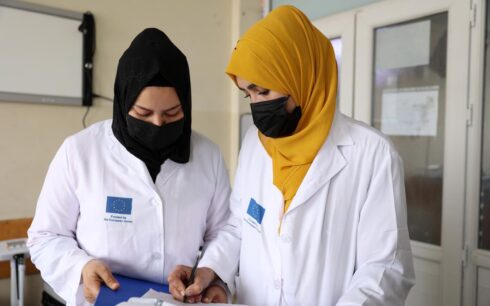PARIS — Kimia Yousofi, Afghanistan’s sprinter, is determined to represent Afghan women. This resolve drove her decision to compete in the Paris 2024 Olympics as an Afghan athlete, rather than under the refugee banner.
The record books will show that Yousofi posted the slowest time in her preliminary round of the women’s 100m, clocking in at 13.42 seconds, slower than her 13.29 seconds in Tokyo. But for Yousofi, this race symbolizes much more.
As the competition concludes, Yousofi removes the bib displaying Afghanistan’s red, green, and black emblem. She flips it over to reveal a message: “Education, Sport, our right.”
“Of course, the Olympic Games is a big dream for every athlete, not just me. I’ve run at the Tokyo Olympics and the Rio Olympics. But now I’m here for Afghanistan’s girls. I almost forgot my dream. I almost forgot everything. I worked hard for three years. But all these things are for Afghanistan’s girls,” Yousofi said.
Three years ago, Yousofi returned to Kabul from the Tokyo Olympics, where she had set a personal best in the 100m. Just a week after her return, the Taliban took control of the country.
“I was in Kabul when the Taliban came. I wanted to stay because I felt I was from this country. My people needed me. But a lot of people told me they couldn’t guarantee my safety. I was a woman with a public face because I’d carried the flag of Afghanistan just a few days before. I had to flee. I went first to Iran, and then from there, Australia helped me get a visa to come there,” she said.
Now in Sydney, where her family joined her, Yousofi has learned English and built a new life. Her mother advised her to retire after competing in two Olympics, but Yousofi refused.
“My mother says, ‘Kimia, you are a girl; stop pushing yourself; don’t make it so hard for yourself’. But I can’t do that. I don’t allow anyone to decide for me. I have to run for all the girls who can’t,” she said.
Yousofi is running not just for the sport but to advocate for Afghan girls’ basic rights, including education and the ability to play sports, which have been stripped away since the Taliban’s return to power.
“I had to choose between competing as a refugee or an Afghan. I was born in Iran as a child of Afghan refugees. But I am an Afghan. I will always represent my women and people. I will always wear my three colors: black, red, and green. I will wear my traditional clothes,” said Yousofi, who runs in a hijab and leggings.
Despite not being in peak physical condition due to an allergy and a knee injury, Yousofi insisted on running. “My knee was really sore, but I said I’m just going to run. I kept icing it and took pain tablets to reduce the pain. But I had to run,” she said.
Yousofi’s message to Afghan girls is clear: “Look for opportunities, and then use them. Even if you get a small one, use it. Don’t give up. Don’t let others make your decisions for you.”





